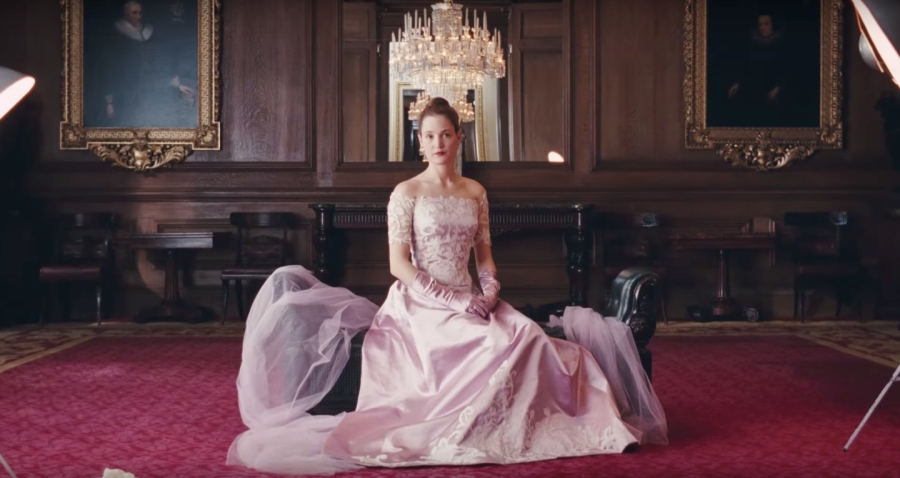I walked into this movie last minute — knowing almost nothing about it — preparing for a drama to unfold. Thus my slack-jawed surprise as my synapsis adapted Hollywood’s poor marketing. I’m pretty sure Phantom Thread is a comedy and a love story, but I may need to see it again to be clear. I’ve never been quite sure whether I am a Paul Thomas Anderson fan or not. I have always really, really wanted to like his films. Phantom Thread is my fourth foray into his work, and I think it has cast the deciding vote. I loved this motion picture, especially after feeling like I understood the intention, if not the meaning.
Phantom Thread’s plot makes little sense, moving along slowly unconcerned with narrative cohesion. But that feels like the point. Sometimes people are weird, and sometimes life is confused and confusing. I have watched so many dysfunctional relationships out in the world, that I am totally ok with the strange twisty-ness of it all.
Anderson’s newest film contains all the logic of, well, a P.T. Anderson film. Daniel Day-Lewis portrays Reynolds Wookcock, an asshole dress designer, who brings his waitress Alma (Vicky Krieps) home, makes her his primary style model, and then psychologically tortures her. Alma’s primary failing manifests in her audacity to actually fall in love with this shallow wretched creature. Reynold’s sister Cyril (Oscar-nominated Lesley Manville) protects the neurotically idiosyncratic designer, while exhibiting an emotionally incestuous connection to him, and aiding in the relationship pruning process whenever someone may start getting in his way.
Krieps’ Alma reacts pretty much in the opposite manner than sound relationship health would dictate. She loves Reynolds, but as soon as she tells him this, he shuts her off and locks her out emotionally. Undeterred, she hangs in there anyway, and hatches a plot to save the unsavable. I have never heard of Krieps before, and while I apparently saw her in Joe Wright’s Hanna (a film I enjoyed but don’t remember at all) this is the first time I have noticed her.
Krieps has this transformative ability to seem quite plain, and then a moment later to be stunningly and distractingly beautiful — all connected to her characters state of mind. She portrays naivitae, and timidness, and then confidence and decisiveness. While I liked The Shape of Water enough, and Sally Hawkins did give a beautiful performance, I would happily trade her out for Krieps to have a slot on the ballot. As Alma is about to be thrust out of Reynold’s life and world, she takes matters into her own hands. She plots to win him back in the most unlikely, and darkly comic of turns. Can she get him to want her, to need her, again?
Day-Lewis is fine … I’ve never actually been all that enamored by him. He still seems like Daniel Day-Lewis in there … I can’t really separate man from actor, and the actor from other roles he has played. He embodies assholes quite well, I’ll say that. But in the end, his role exists to help Alma find her way, and to teach Alma how to pierce his shallow narcissism. Her job in his life is not to make him more human, but ensuring that he can remember what it feels like to experience something other than his own OCD perfection. His creations are not art not for the sake of expression, but for the sake of impression, and the adoration of his shallow, rich clients. Unless those shallow rich clients become unworthy. At one point he literally strips one of his dresses off a drunk aristocrat because she is unfit to wear his design; her alcoholic disrespect is more than he — or apparently his dress — can bear.
Lesley Manville completely deserves her Oscar nod for this restrained near-evil role. She plays the one we love to hate. By her brothers side his entire life, she has met her match in Alma, and she doesn’t like it one bit. To make matters worse, some big mommy issues provide the elephant in the room for this brother and sister. As Alma’s power is growing, Cyril attempts to remove her from Reynolds’ room as he suffers a dire illness, and we see his mother’s ghost standing by the door. Alma refuses to leave, and even sends a house-calling the doctor away to tend him herself. Alma nearly physically throws Cyril out of the room, all while ghost mommy watches in silence. As the door closes, ghost mommy has vanished. If you see the film, you can decide what it means!
Lastly, and perhaps among the most compelling aspects of the film, the design and cinematography bring such beauty and visual style that I could just sit there and watch it with no dialogue at all. In many scenes, it is the lack of camera movement, or the absolute subtly of it, that grants me entrance into this world. Sumptuous wide shots of the spaces combined with a warm, soft color palette create its own visual narrative. This is exactly the kind slow, weird movie I believe we all should love.
Anderson has created another compelling entry in his oeuvre. Day-Lewis performs as you expect, but Vicky Krieps owns this movie. She makes it Alma’s story. It is beautiful, darkly funny and the weirdest love story I have ever seen. I give it an 8.5 thread count out of 10 silky lace dresses.

2 thoughts on “The Phantom Thread Sews Up a Darkly Comic Love Story”